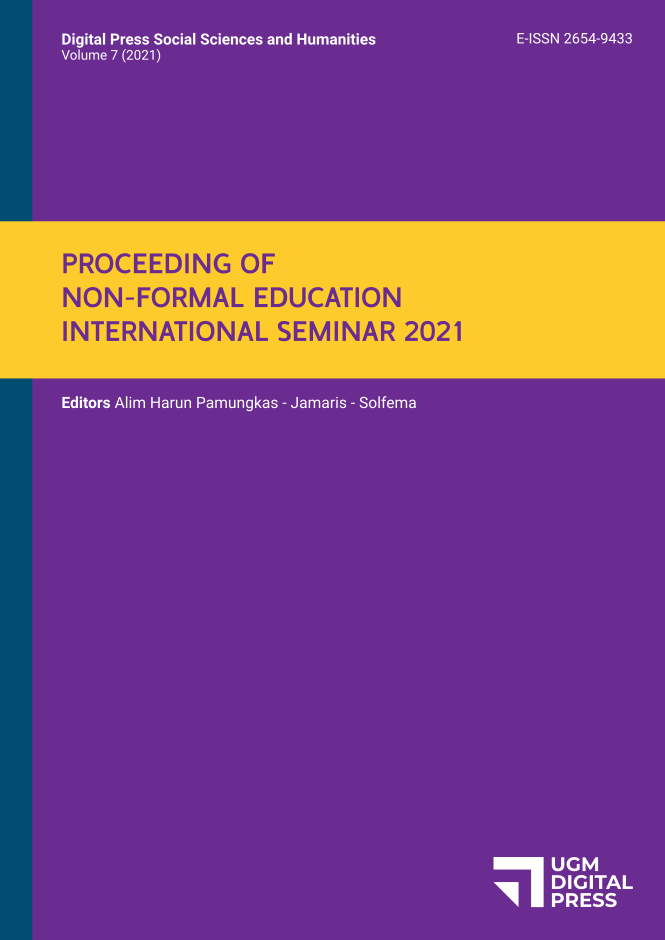Parental Acceptance of Children with Cerebral Palsy: A Family Counseling Approach
Nurhastuti
, Kasiyati
, Zulmiyetri
, Irdamurni
, Damri
, Setiabudi
Department of Special Need Education, Universitas Negeri Padang, Padang, Indonesia
nurhastuti@fip.unp.ac.id
Abstract
Parents may feel a sense of despair when taking care of children with cerebral palsy. Some parents may even find difficulties in accepting the fact that their children were born with the disability. For this reason, needs analysis for parents of children with cerebral palsy is important by using a family counseling service that fits the family culture and socio-economic condition. This research aims to explain the parental needs of parents of children with cerebral palsy. This research used a quantitative approach by applying descriptive statistical analysis and was conducted in Padang with 21 samples of parents of children with cerebral palsy. The data of the research were obtained from questionnaires in a family counseling service for parents of children with cerebral palsy. Results of the research suggested that parental needs of parents with cerebral palsy involve several indicators: parental acceptance; factors influencing parental acceptance; parenting problems and challenges.
Keywords
social entrepreneurship, entrepreneurship, digital, student
References
Burton, P., Lethbridge, L., & Phipps, S. (2008). Children with disabilities and chronic conditions and longer-term parental health. The Journal of Socio-Economics, 37(3), 1168–1186. https://doi.org/10.1016/j.socec.2007.01.032
Eliyanto, H., & Hendriani, W. (2013). Hubungan Kecerdasan Emosi dengan Penerimaan Ibu Terhadap Anak Kandung yang Mengalami Cerebral Palsy. Jurnal Psikologi Pendidikan Dan Perkembanga, 2(2), 124–130.
Ghoreyshyzadeh, F., Hosein Pour Feizi, A. A., Ghaffari, R., & Nourdadgar, A. (2017). Educational Needs Assessment of Family Health Providers in Tabriz Health Care Centers in 2015. Research and Development in Medical Education, 6(1), 12–18. https://doi.org/10.15171/rdme.2017.003
Guillamón, N., Nieto, R., Pousada, M., Redolar, D., Muñoz, E., Hernández, E., Boixadós, M., & Gómez-Zúñiga, B. (2013). Quality of life and mental health among parents of children with cerebral palsy: the influence of self-efficacy and coping strategies. Journal of Clinical Nursing, 22(11–12), 1579–1590. https://doi.org/10.1111/jocn.12124
Kafah, S. (2018). Pengaruh Terapi Thought Stopping Untuk Menurunkan Stres Pada Ibu Yang Memiliki Anak Cerebral Palsy. Master Thesis. Universitas Muhammadiyah Surakarta.
Karadağ Saygi, E., Gıray, E., Peynırcıcerşıt, H., Ulutatar, F., & Aydin, R. (2015). Serebral palsili çocuğu olan ailelerin aile ortamlarının değerlendirilmesi ve gereksinimlerinin belirlenmesi. Turkiye Fiziksel Tip ve Rehabilitasyon Dergisi, 61(4), 320–325. https://doi.org/10.5152/tftrd.2015.70745
Lee, P.-C., Lee, T.-C., Chen, V. C.-H., Chen, M.-L., Shih, D.-H., Shao, W.-C., & Lee, M.-C. (2010). Quality of life in mothers of children with oppositional defiant symptoms: a community sample. Mental Health in Family Medicine, 7(2), 93–100. http://www.ncbi.nlm.nih.gov/pubmed/22477927
Nurhastuti, N., & Fatmawati, F. (2018). Family Counseling Program for Parents Who Have Autistic Children. Journal of ICSAR, 2(2), 163–166. https://doi.org/10.17977/um005v2i22018p163
Ones, K., Yilmaz, E., Cetinkaya, B., & Caglar, N. (2005). Assessment of the Quality of Life of Mothers of Children with Cerebral Palsy (Primary Caregivers). Neurorehabilitation and Neural Repair, 19(3), 232–237. https://doi.org/10.1177/1545968305278857
nurhastuti@fip.unp.ac.id
Abstract
Parents may feel a sense of despair when taking care of children with cerebral palsy. Some parents may even find difficulties in accepting the fact that their children were born with the disability. For this reason, needs analysis for parents of children with cerebral palsy is important by using a family counseling service that fits the family culture and socio-economic condition. This research aims to explain the parental needs of parents of children with cerebral palsy. This research used a quantitative approach by applying descriptive statistical analysis and was conducted in Padang with 21 samples of parents of children with cerebral palsy. The data of the research were obtained from questionnaires in a family counseling service for parents of children with cerebral palsy. Results of the research suggested that parental needs of parents with cerebral palsy involve several indicators: parental acceptance; factors influencing parental acceptance; parenting problems and challenges.Keywords
social entrepreneurship, entrepreneurship, digital, studentReferences
Burton, P., Lethbridge, L., & Phipps, S. (2008). Children with disabilities and chronic conditions and longer-term parental health. The Journal of Socio-Economics, 37(3), 1168–1186. https://doi.org/10.1016/j.socec.2007.01.032
Eliyanto, H., & Hendriani, W. (2013). Hubungan Kecerdasan Emosi dengan Penerimaan Ibu Terhadap Anak Kandung yang Mengalami Cerebral Palsy. Jurnal Psikologi Pendidikan Dan Perkembanga, 2(2), 124–130.
Ghoreyshyzadeh, F., Hosein Pour Feizi, A. A., Ghaffari, R., & Nourdadgar, A. (2017). Educational Needs Assessment of Family Health Providers in Tabriz Health Care Centers in 2015. Research and Development in Medical Education, 6(1), 12–18. https://doi.org/10.15171/rdme.2017.003
Guillamón, N., Nieto, R., Pousada, M., Redolar, D., Muñoz, E., Hernández, E., Boixadós, M., & Gómez-Zúñiga, B. (2013). Quality of life and mental health among parents of children with cerebral palsy: the influence of self-efficacy and coping strategies. Journal of Clinical Nursing, 22(11–12), 1579–1590. https://doi.org/10.1111/jocn.12124
Kafah, S. (2018). Pengaruh Terapi Thought Stopping Untuk Menurunkan Stres Pada Ibu Yang Memiliki Anak Cerebral Palsy. Master Thesis. Universitas Muhammadiyah Surakarta.
Karadağ Saygi, E., Gıray, E., Peynırcıcerşıt, H., Ulutatar, F., & Aydin, R. (2015). Serebral palsili çocuğu olan ailelerin aile ortamlarının değerlendirilmesi ve gereksinimlerinin belirlenmesi. Turkiye Fiziksel Tip ve Rehabilitasyon Dergisi, 61(4), 320–325. https://doi.org/10.5152/tftrd.2015.70745
Lee, P.-C., Lee, T.-C., Chen, V. C.-H., Chen, M.-L., Shih, D.-H., Shao, W.-C., & Lee, M.-C. (2010). Quality of life in mothers of children with oppositional defiant symptoms: a community sample. Mental Health in Family Medicine, 7(2), 93–100. http://www.ncbi.nlm.nih.gov/pubmed/22477927
Nurhastuti, N., & Fatmawati, F. (2018). Family Counseling Program for Parents Who Have Autistic Children. Journal of ICSAR, 2(2), 163–166. https://doi.org/10.17977/um005v2i22018p163
Ones, K., Yilmaz, E., Cetinkaya, B., & Caglar, N. (2005). Assessment of the Quality of Life of Mothers of Children with Cerebral Palsy (Primary Caregivers). Neurorehabilitation and Neural Repair, 19(3), 232–237. https://doi.org/10.1177/1545968305278857

